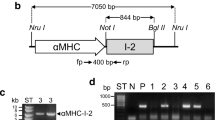Summary
Conditionally transformed human myocardial cell lines would be a valuable resource for studying human cardiac cell biology. We generated clonal human fetal cardiocyte cell lines by transfection of fetal ventricular cardiac cell clones with a plasmid containing a replication-defective mutant of the temperature-sensitive SV40 strain tsA58. Multiple resulting cell lines showed similar features, namely: (1) T antigen (TAg) expression at both permissive (34°C) and restrictive (40.5°C) temperatures; (2) extended growth capacity in comparison with parental wild type, when grown at the permissive temperature; (3) both temperature-dependent and serum-responsive growth, and; (4) an incompletely differentiated fetal phenotype which was similar at both permissive and restrictive temperatures and in the presence and absence of serum. The transformed myocyte phenotype was demonstrated using immunocytochemistry, Western and Northern blotting, and reverse transcription-polymerase chain reaction (RT-PCR). Cell lines expressed skeletal α-actin, atrial natriuretic peptide (ANP), and keratins, but no sarcomeric myosin heavy chain or desmin. Immunoreactive sarcomeric actin was expressed predominantly as a truncated protein of approximately 38 kD. The phenotype of the transformed cells differs from that of the wild-type parental cells as well as from those reported by others who have used TAg to immortalize rodent or human ventricular myocytes. Our cell lines should provide a useful tool for study of the molecular mechanisms regulating growth and differentiation in human cardiac muscle cells.
Similar content being viewed by others
References
Bader, D. M. T.; Fischman, D. A. Immunochemical analysis of myosin heavy chain during avian myogenesis in vivo and in vitro. J. Cell. Biol. 95:763–770; 1982.
Chou, J. Differentiated mammalian cell lines immortalized by temperature-sensitive tumor viruses. Mol. Endocrinol. 3:1511–1514; 1989.
Delcarpio, J.; Lanson, N. J.; Field, L.; Claycomb, W. Morphological characterization of cardiomyocytes isolated from a transplantable cardiac tumor derived from transgenic mouse atria (AT-1 cells). Circ. Res. 69:1591–1600; 1991.
Field, L. J. Atrial natriuretic factor-SV40 T antigen transgenes produce tumors and cardiac arrhythmias in mice. Science 239:1029–1033; 226-1988.
Goldman, B.; Mach, A.; Wurzel, J. Epidermal growth factor promotes a cardiomyoblastic phenotype in human fetal cardiac myocytes. Exp. Cell Res. 228:237–245; 1996.
Goldman, B. I.; Wurzel, J. Effects of subcultivation and culture medium on differentiation of human fetal cardiac myocytes. In Vitro Cell. Dev. Biol. 28A:109–119; 1992.
Harlow, E.; Crawford, L. V., Pim, D. C.; Williamson, N. M. Monoclonal antibodies specific for simian virus 40 tumor antigens. J. Virol. 39:861–869; 1981.
Jahn, L.; Sadoshima, J.; Greene, A.; Parker, C.; Morgan, K. G.; Izumo, S. Conditional differentiation of heart-and smooth muscle-derived cells transformed by a temperature-sensitive mutant of SV40 T antigen. J. Cell Sci. 109:397–407; 1996.
Jha, K. K.; Banga, S.; Palejwala, V.; Ozer, H. L. SV40-mediated immortalization. Exp. Cell Res. 245:1–7; 1998.
Katz, E. B.; Steinhelper, M. E.; Delcarpio, J. B.; Daud, A.I.; Claycomb, W. C.; Field, L. J. Cardiomyocyte proliferation in mice expressing alphacardiac myosin heavy chain-SV40 T-antigen transgenes. Am. J. Physiol. 262:H1867-H1876; 1992.
Kim, B. H.; Sung, S. R., Choi, E. H. et al. Dedifferentiation of conditionally immortalized hepatocytes with long-term in vitro passage. Exp. Mol. Med. 32(1):29–37; 2000.
Kimes, B. W.; Brandt, B. L. Properties of a clonal muscle cell line from rat heart. Exp. Cell Res. 98:367–381; 1976.
Kohtz, D. S.; Dische, N. R.; Inagami, T.; Godlman, B. Growt and partial differentiation of presumptive human cardiac myoblasts in culture. J. Cell Biol. 108:1067–1078; 1989.
Kubo, H.; Margulies, K. B.; Piacentino, III, V.; Gaughn, J. P.; Houser, S. R. Patients with end-stage congestive heart failure treated with beta-adrenergic receptor antagonists have improved ventricular myocyte calcium regulatory protein abundance. Circulation 104:1012–1018; 2001.
Miller, C.; Rulfs, J.; Jaspers, S. R.; Buckholt, M.; Miller, T. B., Jr. Transformation of adult ventricular myocytes with the temperature sensitive A58 (tsA58) mutant of the SV40 large T antigen. Mol. Cell. Biochem. 136:29–34; 1994.
Price, T. N.; Moorwood, K.; James, M. R.; Burke, J. F.; Mayne, L. V. Cell cycle progression, morphology and contact inhibition are regulated by the amound of SV40 T antigen in immortal human cells. Oncogene 9:2897–2904; 1994.
Radna, R.; Caton, Y.; Jha, K.; Kaplan, P.; Li, G.; Traganos, F. Growth of immortal simian virus 40 tsA transformed human fibroblasts is temperature dependent. Mol Cell Biol. 9:3093–3096; 1989.
Schiaffino, S.; Samuel, J. L.; Sassoon, D., et al. Nonsynchronous accumulation of alpha-skeletal actin and beta-myosin heavy chain mRNAs during early stages of pressure-overload-induced cardiac hypertrophy demonstrated by in situ hybridization. Circ. Res. 64:937–948; 1989.
Sen, A.; Dummon, P.; Henderson, S. A.; Gerard, R. D.; Chien, K. R. Terminally differentiated neonatal rat myocardial cells proliferate and maintain specific differentiated functions following expression of SV40 large T antigen. J. Biol. Chem. 263:19132–19136; 1988.
Sheffield, J. B.; Graff, D.; Li H. P. A solid-phase method for the quantitation of protein in the presence of sodium dodecyl sulfate and other interfering substances. Anal. Biochem. 165:471–476; 1987.
Skalli, O.; Gabbiani, G.; Babai, F.; Pizzolato, G.; Schurch, W. Intermediate-filament proteins and actin isoforms as markers for soft tissue tumor differentiation and origin II: Rhabdomyosarcomas. Am. J. Pathol. 130:515–531; 1988.
Tegtmeyer, P. Function of simian virus 40 gene A in transforming infection. Virology 15:613–618; 1975.
Wang, Y.-C.; Neckelmann, N.; Mayne, A.; Hershkowitz, A.; Alagarsamy, S.; Sell, K. W.; Ahmed-Assari, A. Establishment of a human fetal cardiac myocyte cell line. In Vitro Cell. Dev. Biol. 27A:63–74; 1991.
Author information
Authors and Affiliations
Corresponding author
Rights and permissions
About this article
Cite this article
Goldman, B.L., Amin, K.M., Kubo, H. et al. Human myocardial cell lines generated with SV40 temperature-sensitive mutant TSA58. In Vitro Cell.Dev.Biol.-Animal 42, 324–331 (2006). https://doi.org/10.1290/0605032.1
Received:
Accepted:
Issue Date:
DOI: https://doi.org/10.1290/0605032.1




